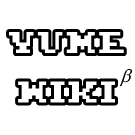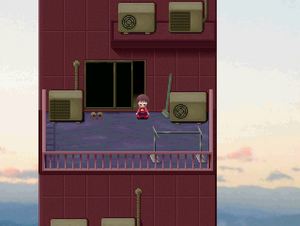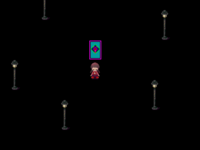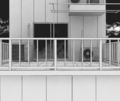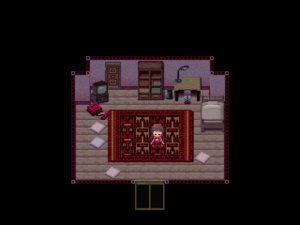No edit summary |
(→Trivia: translation info) |
||
| (27 intermediate revisions by 4 users not shown) | |||
| Line 1: | Line 1: | ||
{{Locationbox | {{Locationbox | ||
|headercolor = #370a11 | |||
|headerfontcolor = #947972 | |||
|image = Mado's_Room.png | |image = Mado's_Room.png | ||
| | |JapaneseName = 窓付きの部屋 | ||
|Name = 現実の部屋, Real Room, ベランダ, Veranda | |||
|Effects = None | |Effects = None | ||
|Map Type = Small, | |Map Type = Small, Non-looping, Multiple maps | ||
|Events = [[Yume Nikki | |Events = [[Yume Nikki:Events#Crick in the Neck|Crick in the Neck]], [[Yume Nikki:Events#NASU|NASU]], [[Yume Nikki:Events#KALIMBA TV Channel|KALIMBA TV Channel]], [[Yume Nikki:Events#Ending|Ending]] | ||
|NPCS = [[Yume Nikki | |NPCS = [[Yume Nikki:NASU|NASU]], [[Yume Nikki:KALIMBA|KALIMBA]] | ||
|Connections = | |Connections = {{Connection|Nexus|misc_label=From the Dream Room}}, {{Connection|Staircase of Hands|chance_description=1/5 chance determined per dream session|chance_percentage=20%}} | ||
|BGM = ゆめにっき | |BGM = | ||
|Chipset / Panorama = ベランダ, マイルーム (Chipset, Tileset) | {{BGM|title=ゆめにっき|filename=save.ogg|label=Save theme|speed=100}}, | ||
| | {{BGM|title=ファミリィゲームであそぶ?|filename=BGM_015-70.ogg|label=Famicom menu|speed=70}} | ||
| | {{BGM|title=ゆめはいつもベランダから|filename=BGM_034.ogg|label=Madotsuki's Dream Room|speed=100}}, | ||
{{BGM|filename=KALIMBA.ogg|title=カリンバ|label=KALIMBA TV Channel|speed=100}}, | |||
{{BGM|filename=BGM_010.ogg|title=「 」|label=Ending|speed=100}} | |||
|Chipset / Panorama = ベランダ, マイルーム (Chipset, Tileset), 月夜, 山, 夕焼けa, 夕焼けb (Panoramas) | |||
|Map ID = 0003 (Real Room), 0004 (Balcony), 0006 (Dream Room), 0007 (Dream Balcony day), 0008 (Dream Balcony night) | |||
|VersionAdded = 0.00 | |||
}} | }} | ||
'''Madotsuki's Room''' | '''Madotsuki's Room''' is where the player starts and [[Yume Nikki:Ending|ends]] the game. This room and its balcony are the only locations [[Yume Nikki:Madotsuki|Madotsuki]] can access outside of her dreams. | ||
==Features== | ==Features== | ||
===Real World=== | ===Real World=== | ||
Madotsuki's Room is where Madotsuki resides. It is a rectangular room with wooden floorboards and a light-purple wall with a dark-purple baseboard. To the north is a door leading outside of the room, though Madotsuki will simply shake her head when attempting to interact with it in the real world. This may be either due to her being a [ | Madotsuki's Room is where Madotsuki resides. It is a rectangular room with wooden floorboards and a light-purple wall with a dark-purple baseboard. To the north is a door leading outside of the room, though Madotsuki will simply shake her head when attempting to interact with it in the real world. This may be either due to her being a [[wikipedia:Hikikomori|hikikomori]], or because Madotsuki is physically unable to open it. To the south is a sliding door leading to the room's balcony, revealing the room is in a tall building high in the sky. The outside world as seen from the balcony changes depending on the time of day. | ||
[[File:Madotsuki's Balcony (Day).png|thumb|right|Madotsuki's Balcony during the day.]] | [[File:Madotsuki's Balcony (Day).png|thumb|right|Madotsuki's Balcony during the day.]] | ||
Decorating the room are four pillows, a bookcase, a desk with a desktop lamp and rolling chair, a CRT television with a red Famicom console, a carpet resembling Mesoamerican textile art, and a brown [[Yume Nikki | Decorating the room are four pillows, a bookcase, a desk with a desktop lamp and rolling chair, a CRT television with a red Famicom console, a carpet resembling Mesoamerican textile art, and a brown [[Yume Nikki:Beds|bed]] which Madotsuki can get in to sleep, prompting a three second countdown in the top left corner of the screen. The rolling chair can be sat on to start writing in Madotsuki's diary, which gives the player the option to save the game. The television can be turned on, though only a test card appears and the television's only function is for playing ''[[Yume Nikki:NASU|NASU]]'', which can be done by interacting with the Famicom. On the balcony are several air conditioning units, a pair of green shoes, a broom, and a drying rack. | ||
In the [[Yume Nikki | In the [[Yume Nikki:Official Manga|manga]], her room is the same and has the same role as the game. However, the manga dwells on the theory that she cannot leave the room because someone locked her in. | ||
===Dream Representation=== | ===Dream Representation=== | ||
When Madotsuki falls asleep in her bed, she will start her dream sequence on a dream representation of her balcony (夢ベランダ, Dream Veranda). Everything appears normal with the exception of the background, which will be different between the real and dream worlds. The bedroom (夢の部屋, Dream Room) is also nearly identical, with the exception of the missing Famicom. | When Madotsuki falls asleep in her bed, she will start her dream sequence on a dream representation of her balcony (夢ベランダ, Dream Veranda). Everything appears normal with the exception of the background, which will be different between the real and dream worlds. The bedroom (夢の部屋, Dream Room) is also nearly identical, with the exception of the missing Famicom. | ||
Though the room appears overall the same, some objects within the room have different functions. The television will no longer display a test card, instead showing a black channel with a large eye. The television also has a 1/8 chance of showing a [[Yume Nikki | Though the room appears overall the same, some objects within the room have different functions. The television will no longer display a test card, instead showing a black channel with a large eye. The television also has a 1/8 chance of showing a [[Yume Nikki:KALIMBA|KALIMBA]] face and playing the [[Yume Nikki:Events#KALIMBA TV Channel|KALIMBA TV Channel]] event. The rolling chair can also be sat in and equipped like an [[Yume Nikki:Effects|effect]], letting Madotsuki move around while seated, though Madotsuki can not get off the chair until it is returned to her desk. Getting into the bed once again also has a 1/5 chance of being able to send you to the [[Yume Nikki:Staircase of Hands|Staircase of Hands]]. Most important of all the differences is the door to exit her room, which can now be opened to enter the [[Yume Nikki:Nexus|Nexus]] and thus the expansive dream world. | ||
==Trivia== | ==Trivia== | ||
*There is a 1 in 64 chance that upon waking up, Madotsuki will have a [[Yume Nikki | *There is a 1 in 64 chance that upon waking up, Madotsuki will have a [[Yume Nikki:Events#Crick in the Neck|crick in her neck]] that will cause her head to be always facing towards the left. While in this state, she cannot play ''NASU'' or save the game and can only go back to sleep. | ||
*In [[Yume Nikki | *The original Japanese title of the console is "Family Game". The [[Yume Nikki:Translation Differences|Steam translation]] changes the title to "Famtendo", likely to make it more obvious to international players that it parodies the Famicom (Family Computer), the original Japanese name for the [[wikipedia:Nintendo Entertainment System|NES]]. | ||
**The translation made by [//ynfg.yume.wiki/Vgperson vgperson] used by her [//ynfg.yume.wiki/REM-9:_The_Yume_Nikki_Randomizer randomizer mod] translates the title to "FamiGame". | |||
*The Uboachan translation omits the message that appears when riding on the chair in the dream room. | |||
*The mountain background in the dream room has a 1/3 chance of being selected, compared to the 2/3 chance of the cloud background. | |||
*In [[Yume Nikki:Old Versions#Version 0.04|version 0.04]], there is an unused panoramic background depicting several images of Madotsuki's room in a Fibonacci spiral formation. Though the use of this background is unknown, it could have been intended for Madotsuki's dream bedroom or the dream balcony. | |||
[[File:Yn006_dreamTV.png|thumb|right]] | [[File:Yn006_dreamTV.png|thumb|right]] | ||
*In versions before [[Yume Nikki | *In versions before [[Yume Nikki:Old Versions#Version 0.07|0.07]], the TV in the dream world had a different design on it. In 0.07, there is a 1 in 8 chance that the dream TV will be on by default. | ||
*The door that leads to the [[Yume Nikki | *The door that leads to the [[Yume Nikki:Events#FACE|FACE]] event in the stairway of Number World is the same one that Madotsuki refuses to open in the real world. This could suggest that [[Yume Nikki:FACE|FACE]] represents her fear of whatever is beyond her room. In the files of [[Yume Nikki:Old Versions#Version 0.08|version 0.08]], graphics for a Paracas-styled gate known as [[Yume Nikki:FACE#Trivia|FACEtile]] could have been used instead. | ||
==[[Yume Nikki | ==[[Yume Nikki:Theories|Theories]]== | ||
[[File:YN Lamp World.png|thumb|right|200px|Reoccurring parts of the dream world may be due to real-world elements in Madotsuki's room, such as her desk lamp.]] | |||
[[File: | Due to Madotsuki's room being the only thing to visually stimulate Madotsuki in the real world, it's likely that elements of her room have affected her dreams. Some elements of her room appear straightforwardly in her dreams, such as the identical Beds in places such as [[Yume Nikki:Block World|Block World]] and [[Yume Nikki:Snow World|Snow World]], the many lamps in places such as [[Yume Nikki:Puddle World|Puddle World]] and [[Yume Nikki:Lamp World|Lamp World]] (as she has a small lamp on her desk that lights up when writing in her diary), and even her door appearing in the [[Yume Nikki:Number World#Stairway|Number World Stairway]] as well as doors being the main theme of the Nexus area adjacent to her dream room. Her Famicom, which can play the ''NASU'' game, appears to have also affected her dreams in the form of the [[Yume Nikki:FC House|various]] [[Yume Nikki:FC World A|Famicom]] [[Yume Nikki:FC World B|worlds]]. The large carpet in her room has a very similar appearance to Paracas textile work, which may have inspired the many instances of [[Yume Nikki:Indigenous Imagery|indigenous imagery]] in her dreams. | ||
Due to Madotsuki's room being the only thing to visually stimulate Madotsuki in the real world, it's likely that elements of her room have affected her dreams. Some elements of her room appear straightforwardly in her dreams, such as the identical Beds in places such as [[Yume Nikki | |||
Madotsuki's room in the real world has drawn similarities to a story involving the Japanese comedian Tomoaki Hamatsu (also known by his stage name "Nasubi") and could have possibly been the inspiration for Madotsuki's real-world situation. In 1998, Nasubi had won a lottery for a job in show-business, which turned out to be a reality TV stunt in which he was locked in an apartment with no food or clothing, live-streamed, and forced to win his way out by earning one million yen worth of prizes via magazine sweepstakes. Some elements of Nasubi's experience, whether they were there from the beginning or were won through the sweepstakes, could be represented in Madotsuki's room: | |||
Madotsuki's room in the real world has drawn similarities to a story involving the Japanese comedian Tomoaki Hamatsu (also known by his stage name "Nasubi") and could have possibly been the inspiration for Madotsuki's real-world situation. In 1998, Nasubi had won a lottery for a show business | |||
*At the beginning of the challenge, he had a rack of magazines so he could enter sweepstakes. Madotsuki has a bookcase in her room filled with books. | *At the beginning of the challenge, he had a rack of magazines so he could enter sweepstakes. Madotsuki has a bookcase in her room filled with books. | ||
*Other parts of the room before Nasubi had won anything included a cushion and table, which could be represented by the table that Madotsuki sits at and the various pillows scattered throughout her room. | *Other parts of the room before Nasubi had won anything included a cushion and table, which could be represented by the table that Madotsuki sits at and the various pillows scattered throughout her room. | ||
*Nasubi won a television by entering sweepstakes, though it had no antennae or cable, so he could not watch it, similar to how the TV in Madotsuki's room has no channels. He eventually won a VCR and two video tapes to watch, which could be why two channels appear on Madotsuki's TV in the dream world (the eye channel and the KALIMBA channel). | *Nasubi won a television by entering sweepstakes, though it had no antennae or cable, so he could not watch it, similar to how the TV in Madotsuki's room has no channels. He eventually won a VCR and two video tapes to watch, which could be why two channels appear on Madotsuki's TV in the dream world (the eye channel and the KALIMBA channel). | ||
*He won a Playstation on which he could play games, which could be represented by the Famicom in Madotsuki's room whose only playable game is ''NASU''. The eggplant theme associated with ''NASU'' may also reference the "Nasubi" stage name. | *He won a Playstation on which he could play games, which could be represented by the Famicom in Madotsuki's room whose only playable game is ''NASU''. The eggplant theme associated with ''NASU'' may also reference the "Nasubi" stage name. | ||
*He also wrote in | *He also wrote in several diaries, which became best-selling books in Japan. The diary concept is central to ''Yume Nikki'' and is used to save the game. | ||
*While not located in Madotsuki's Room, one of the unused effects is a black blindfold, a similar one of which was usually put on Nasubi whenever he was moved between locations during his challenge. | |||
It's possible that the events of ''Yume Nikki'' are a fictional recreation of an event similar to Nasubi's own experience, which would explain why Madotsuki is unable to leave her room and is shown to live in the unrealistic condition of being in an apartment with no food or bathroom. This could be why she jumps from the balcony at the end of the game, as it is the only possible escape, and living in such conditions could have negative psychological effects on a person. It's also likely that KIKIYAMA was simply aware of the Nasubi story and used it as inspiration for the real world's setting. | It's possible that the events of ''Yume Nikki'' are a fictional recreation of an event similar to Nasubi's own experience, which would explain why Madotsuki is unable to leave her room and is shown to live in the unrealistic condition of being in an apartment with no food or bathroom. This could be why she jumps from the balcony at the end of the game, as it is the only possible escape, and living in such conditions could have negative psychological effects on a person. It's also likely that KIKIYAMA was simply aware of the Nasubi story and used it as inspiration for the real world's setting. | ||
==Gallery== | ==Gallery== | ||
<gallery | <gallery> | ||
Mado_Balcony_Nite.png|Madotsuki's balcony at night. | Mado_Balcony_Nite.png|Madotsuki's balcony at night. | ||
マイルーム.png|The room's tileset. | マイルーム.png|The room's tileset. | ||
| Line 62: | Line 69: | ||
山.png|The first dream balcony parallax background. | 山.png|The first dream balcony parallax background. | ||
夕焼けb.png|The second dream balcony parallax background. | 夕焼けb.png|The second dream balcony parallax background. | ||
I001.jpg|Madotsuki's room and balcony as they appear in the [[Yume Nikki | I001.jpg|Madotsuki's room and balcony as they appear in the [[Yume Nikki:Official Manga|manga]]. | ||
manga balcony.PNG | manga balcony.PNG | ||
</gallery> | </gallery> | ||
Revision as of 00:34, 19 November 2024
| Madotsuki's Room | |||||||||||||||||||
|---|---|---|---|---|---|---|---|---|---|---|---|---|---|---|---|---|---|---|---|
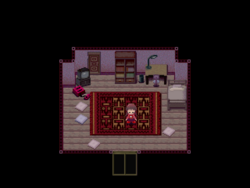
| |||||||||||||||||||
| Basic Info | |||||||||||||||||||
| Japanese Name(s) |
窓付きの部屋 | ||||||||||||||||||
| Effects | None | ||||||||||||||||||
| Events | Crick in the Neck, NASU, KALIMBA TV Channel, Ending | ||||||||||||||||||
| Notable NPCs | NASU, KALIMBA | ||||||||||||||||||
| Other | |||||||||||||||||||
| Connecting Areas | Nexus (From the Dream Room) Staircase of Hands 🍀 | ||||||||||||||||||
| BGM | 🔊 ゆめにっき – Save theme 🔊 ファミリィゲームであそぶ? – Famicom menu 🔊 ゆめはいつもベランダから – Madotsuki's Dream Room | ||||||||||||||||||
| Map ID | 0003 (Real Room) 0004 (Balcony) 0006 (Dream Room) 0007 (Dream Balcony day) 0008 (Dream Balcony night) | ||||||||||||||||||
| Map Type | Small, Non-looping, Multiple maps | ||||||||||||||||||
| Version Added | 0.00 | ||||||||||||||||||
| |||||||||||||||||||
Madotsuki's Room is where the player starts and ends the game. This room and its balcony are the only locations Madotsuki can access outside of her dreams.
Features
Real World
Madotsuki's Room is where Madotsuki resides. It is a rectangular room with wooden floorboards and a light-purple wall with a dark-purple baseboard. To the north is a door leading outside of the room, though Madotsuki will simply shake her head when attempting to interact with it in the real world. This may be either due to her being a hikikomori, or because Madotsuki is physically unable to open it. To the south is a sliding door leading to the room's balcony, revealing the room is in a tall building high in the sky. The outside world as seen from the balcony changes depending on the time of day.
Decorating the room are four pillows, a bookcase, a desk with a desktop lamp and rolling chair, a CRT television with a red Famicom console, a carpet resembling Mesoamerican textile art, and a brown bed which Madotsuki can get in to sleep, prompting a three second countdown in the top left corner of the screen. The rolling chair can be sat on to start writing in Madotsuki's diary, which gives the player the option to save the game. The television can be turned on, though only a test card appears and the television's only function is for playing NASU, which can be done by interacting with the Famicom. On the balcony are several air conditioning units, a pair of green shoes, a broom, and a drying rack.
In the manga, her room is the same and has the same role as the game. However, the manga dwells on the theory that she cannot leave the room because someone locked her in.
Dream Representation
When Madotsuki falls asleep in her bed, she will start her dream sequence on a dream representation of her balcony (夢ベランダ, Dream Veranda). Everything appears normal with the exception of the background, which will be different between the real and dream worlds. The bedroom (夢の部屋, Dream Room) is also nearly identical, with the exception of the missing Famicom.
Though the room appears overall the same, some objects within the room have different functions. The television will no longer display a test card, instead showing a black channel with a large eye. The television also has a 1/8 chance of showing a KALIMBA face and playing the KALIMBA TV Channel event. The rolling chair can also be sat in and equipped like an effect, letting Madotsuki move around while seated, though Madotsuki can not get off the chair until it is returned to her desk. Getting into the bed once again also has a 1/5 chance of being able to send you to the Staircase of Hands. Most important of all the differences is the door to exit her room, which can now be opened to enter the Nexus and thus the expansive dream world.
Trivia
- There is a 1 in 64 chance that upon waking up, Madotsuki will have a crick in her neck that will cause her head to be always facing towards the left. While in this state, she cannot play NASU or save the game and can only go back to sleep.
- The original Japanese title of the console is "Family Game". The Steam translation changes the title to "Famtendo", likely to make it more obvious to international players that it parodies the Famicom (Family Computer), the original Japanese name for the NES.
- The translation made by vgperson used by her randomizer mod translates the title to "FamiGame".
- The Uboachan translation omits the message that appears when riding on the chair in the dream room.
- The mountain background in the dream room has a 1/3 chance of being selected, compared to the 2/3 chance of the cloud background.
- In version 0.04, there is an unused panoramic background depicting several images of Madotsuki's room in a Fibonacci spiral formation. Though the use of this background is unknown, it could have been intended for Madotsuki's dream bedroom or the dream balcony.
- In versions before 0.07, the TV in the dream world had a different design on it. In 0.07, there is a 1 in 8 chance that the dream TV will be on by default.
- The door that leads to the FACE event in the stairway of Number World is the same one that Madotsuki refuses to open in the real world. This could suggest that FACE represents her fear of whatever is beyond her room. In the files of version 0.08, graphics for a Paracas-styled gate known as FACEtile could have been used instead.
Theories
Due to Madotsuki's room being the only thing to visually stimulate Madotsuki in the real world, it's likely that elements of her room have affected her dreams. Some elements of her room appear straightforwardly in her dreams, such as the identical Beds in places such as Block World and Snow World, the many lamps in places such as Puddle World and Lamp World (as she has a small lamp on her desk that lights up when writing in her diary), and even her door appearing in the Number World Stairway as well as doors being the main theme of the Nexus area adjacent to her dream room. Her Famicom, which can play the NASU game, appears to have also affected her dreams in the form of the various Famicom worlds. The large carpet in her room has a very similar appearance to Paracas textile work, which may have inspired the many instances of indigenous imagery in her dreams.
Madotsuki's room in the real world has drawn similarities to a story involving the Japanese comedian Tomoaki Hamatsu (also known by his stage name "Nasubi") and could have possibly been the inspiration for Madotsuki's real-world situation. In 1998, Nasubi had won a lottery for a job in show-business, which turned out to be a reality TV stunt in which he was locked in an apartment with no food or clothing, live-streamed, and forced to win his way out by earning one million yen worth of prizes via magazine sweepstakes. Some elements of Nasubi's experience, whether they were there from the beginning or were won through the sweepstakes, could be represented in Madotsuki's room:
- At the beginning of the challenge, he had a rack of magazines so he could enter sweepstakes. Madotsuki has a bookcase in her room filled with books.
- Other parts of the room before Nasubi had won anything included a cushion and table, which could be represented by the table that Madotsuki sits at and the various pillows scattered throughout her room.
- Nasubi won a television by entering sweepstakes, though it had no antennae or cable, so he could not watch it, similar to how the TV in Madotsuki's room has no channels. He eventually won a VCR and two video tapes to watch, which could be why two channels appear on Madotsuki's TV in the dream world (the eye channel and the KALIMBA channel).
- He won a Playstation on which he could play games, which could be represented by the Famicom in Madotsuki's room whose only playable game is NASU. The eggplant theme associated with NASU may also reference the "Nasubi" stage name.
- He also wrote in several diaries, which became best-selling books in Japan. The diary concept is central to Yume Nikki and is used to save the game.
- While not located in Madotsuki's Room, one of the unused effects is a black blindfold, a similar one of which was usually put on Nasubi whenever he was moved between locations during his challenge.
It's possible that the events of Yume Nikki are a fictional recreation of an event similar to Nasubi's own experience, which would explain why Madotsuki is unable to leave her room and is shown to live in the unrealistic condition of being in an apartment with no food or bathroom. This could be why she jumps from the balcony at the end of the game, as it is the only possible escape, and living in such conditions could have negative psychological effects on a person. It's also likely that KIKIYAMA was simply aware of the Nasubi story and used it as inspiration for the real world's setting.
Gallery
Madotsuki's room and balcony as they appear in the manga.
- 370a11
- 947972
